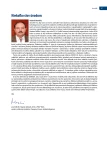Gliflozins and heart: Analyses of EMPRISE study
Authors:
Marián Mokáň; Peter Galajda
Authors‘ workplace:
I. Interná klinika JLF UK a UN Martin
Published in:
Forum Diab 2020; 9(2): 115-119
Category:
Overview
Sodium-glucose co-transporter 2 (SGLT2) inhibitors, gliflozins are a new class of diabetic medications indicated for the treatment of type 2 diabetes mellitus. Apart from glycemic control and low risk of hypoglycemia, gliflozins have been shown to provide significant cardiovascular benefit in patients with type 2 diabetes mellitus. They significantly reduce risk of heart failure, as it was shown in studies EMPAREG-OTCOME with empagliflozin, CANVAS with canagliflozin and DECLARE-TIMI-58 with dapagliflozin in subgroup of patients with high cardiovascular risk. Benefit of empagliflozin in reduced hospitalization for heart failure compared to gliptins, as well as agonists of glucagon like peptide-1, was confirmed also in real word evidence study EMPRISE. There was profit also for patients without cardiovascular disease or heart failure. Study EMPRISE from real world evidence confirmed results from study EMPAREG-OUTCOME, where empagliflozin treatment was associated with reduction of primary cardiovascular composite about 14 %, cardiovascular death about 38 %, total mortality about 32 % and heart failure about 35 %.
Keywords:
type 2 diabetes mellitus – cardiovascular benefit – heart failure – gliflozins – sodium-glucose co-transporter 2 (SGLT2) inhibitors
Sources
Martinka E, Uličiansky V, Mokáň M et al. Konsenzuálne terapeutické odporúčanie Slovenskej diabetologickej spoločnosti pre diabetes mellitus 2. typu (2018). Vnitřní Lék 2018; 64(4): 405–426.
Martinka E, Tkáč I, Mokáň M et al. Interdisciplinárne štandardy diagnostiky a liečby diabetes mellitus, jeho komplikácií a najvýznamnejších sprievodných ochorení. Forum Diab 2018; 7(Suppl 1): 5–153.
Vallon V, Thomson SC. Targeting renal glucose reabsorption to treat hyperglycaemia: the pleiotropic effects of SGLT2 inhibition. Diabetologia 2017; 60(2): 215–225. Dostupné z DOI: <http://dx.doi.org/10.1007/s00125–016–4157–3>.
Monami M, Nardini C, Mannucci E. Efficacy and safety of sodium glucose co-transport-2 inhibitors in type 2 diabetes: a meta-analysis of randomized clinical trials. Diabetes Obes Metab 2014; 16(5): 457–466. Dostupné z DOI: <http://dx.doi.org/10.1111/dom.12244>.
Mokáň M, Galajda P. Perspektívy liečby diabetes mellitus inhibítormi sodíko-glukózového kotransportéra-2. Diab Obez 2018; 18 (35): 43–50.
Schroner Z, Haluzík M, Mráz M et al. Antidiabetiká a kardiovaskulárne riziko. SchronerMED: Košice 2017. ISBN 978–80–8129–073–2.
Zinman B, Wanner C, Lachin JM et al. [EMPAREG-OUTCOME Investigators]. Empagliflozine, cardiovascular outcomes, and mortality in type 2 diabetes. N Engl J Med 2015; 373(22): 2117–2128. Dostupné z DOI: <http://dx.doi.org/10.1056/NEJMoa1504720>.
Neal B, Perkovic V, Mahaffey KW et al. [CANVAS Program Collaborative Group]. Canagliflozine and cardiovascular and renal events in type 2 diabetes. N Engl J Med 2017; 377(7): 644–657.Dostupné z DOI: <http://dx.doi.org/10.1056/NEJMoa1611925>.
Wiviott SD, Raz I, Bonaca MP et al. Dapagliflozin and cardiovascular outcomes in type 2 diabetes. N Engl J Med 2019; 380(4): 347–357. Dostupné z DOI: <http://dx.doi.org/10.1056/NEJMoa1812389>.
Tkáč I. Miesto agonistov GLP-1 receptorov a inhibítorov SGLT-2 v modernej liečbe diabetu 2. typu. Diab Obez 2017; 17(34): 17–24.
Cannon CP, McGuire DK, Cherney D et al. Results of the eValuation of ERTugliflozin EffIcacy and Safety CardioVascular Outcomes Trial (VERTIS CV). 80th American Diabetes Association Virtual Scientific Sessions; June 16, 2020.
Patorno E, Pawar A, Franklin JM et al. Empagliflozin and the risk of heart failure hospitalization in routine clinical care: a first analysis from the empagliflozin comparative effectiveness and safety (EMPRISE) Study. Circulation 2019; 139(25): 2822–2830. Dostupné z DOI: <http://dx.doi.org/10.1161/CIRCULATIONAHA.118.039177>.
Schernthaner G, Karasik A, Abraitienė A et al. Evidence from routine clinical practice: EMPRISE provides a new perspective on CVOTs. Cardiovasc Diabetol 2019; 18(1): 115. Dostupné z DOI: <http://dx.doi.org/10.1186/s12933–019–0920–3>.
Martinka E. Štúdia EMPRISE: empagliflozín redukuje počet hospitalizácií pre srdcové zlyhávanie. Potvrdenie z bežnej klinickej praxe. Forum Diab 2019; 8(3): 193–199.
Pawar A, Patorno E, Deruaz-Luyet A et al. Reduced healthcare utilization in routine care initiators of empagliflozin with and without heart failure: interim analysis from the EMPagliflozin compaRative effectIveness and SafEty (EMPRISE) study. Eur Heart J 2019; 40(Suppl 1): Dostupné z DOI: <http://dx.doi.org/10.1093/eurheartj/ehz746.0181>.
Patorno E, Pawar A, Bessette LG et al. Effectiveness and safety of empagliflozin in routine care patients: interim results from the EMPagliflozin compaRative effectIveness and SafEty (EMPRISE) study. ADA Poster book 2020. 134-LB. Dostupné z DOI: <https://doi.org/10.2337/db20–134-LB>.
Patorno E, Pawar A, Franklin J et al. Cardiovascular effectiveness of empagliflozin compared to DPP4 inhibitors and to GLP1 receptor agonists: Interim analysis from the Empagliflozin Comparative Effectiveness and Safety (EMPRISE) study. Circulation 2019; 140(Suppl 1): A11928.
Patorno E, Pawar A, Bessette LG et al. Cardiovascular outcomes in older adults initiating Empagliflozin vs. DPP4 inhibitors and GLP1 receptor agonists: a subgroup analysis from the EMPRISE study. ADA Poster Book 2020. 133-LB. Dostupné z DOI: <https://doi.org/10.2337/db20–133-LB>.
Staels B. Cardiovascular protection by sodium glucose cotransporter 2 inhibitors: potential mechanisms. Am J Cardiol 2017; 120(1S): S28-S36. Dostupné z DOI: <http://dx.doi.org/10.1016/j.amjcard.2017.05.013>.
Bertero E, Prates Roma L, Ameri P, Maack C. Cardiac effects of SGLT2 inhibitors: the sodium hypothesis. Cardiovasc Res 2018; 114(1): 12–18. Dostupné z DOI: <http://dx.doi.org/10.1093/cvr/cvx149>.
Verma S, McMurray JJV. SGLT2 inhibitors and mechanisms of cardiovascular benefit: a state-of-the-art review. Diabetologia 2018; 61(10): 2108–2117. Dostupné z DOI: <http://dx.doi.org/10.1007/s00125–018–4670–7>.
Lopaschuk GD, Verma S. Mechanisms of cardiovascular benefits of sodium glucose co-transporter 2 (SGLT2) inhibitors: A State-of-the-Art Review. JACC Basic Transl Sci 2020; 5(6): 632–644. Dostupné z DOI: <http://dx.doi.org/10.1016/j.jacbts.2020.02.004>.
Verma S, Mazer CD, Yan AT et al. Effect of empagliflozin on left ventricular mass in patients with type 2 diabetes mellitus and coronary artery disease: The EMPA-HEART CardioLink-6 randomized clinical trial. Circulation 2019; 140(21): 1693–1702. Dostupné z DOI: <http://dx.doi.org/10.1161/CIRCULATIONAHA.119.042375>.
[American Diabetes Association]. 9. Cardiovascular Disease and Risk Management: Standards of Medical Care in Diabetes-2018. Diabetes Care 2018; 41 (Suppl 1): S86-S104. Dostupné z DOI: <http://dx.doi.org/10.2337/dc18-S009>.
Packer M, Anker SD, Butler J et al. Cardiovascular and renal outcomes with empagliflozin in heart failure. N Engl J Med 2020. Dostupné z DOI: <http://dx.doi.org/10.1056/NEJMoa2022190>.
Labels
Diabetology Endocrinology Internal medicineArticle was published in
Forum Diabetologicum

Most read in this issue
- Liečba inhibítormi SGLT2 u pacientov so srdcovým zlyhávaním: Čo priniesla štúdia DAPA-HF pre kardiovaskulárnu diabetológiu?
- Pathophysiological aspects of chronic heart failure
- Gliflozins and heart: Analyses of EMPRISE study
- Chronic heart failure: a minimum for diabetologist
